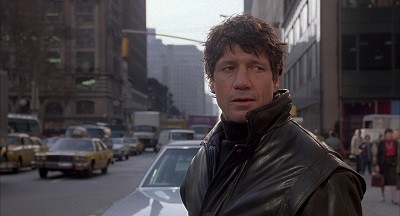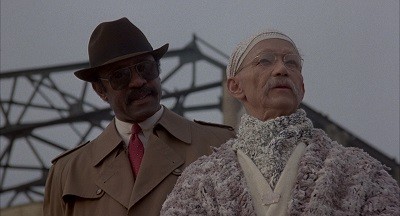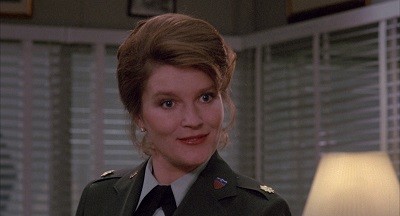| Reviews & Columns |
|
Reviews DVD TV on DVD Blu-ray 4K UHD International DVDs In Theaters Reviews by Studio Video Games Features Collector Series DVDs Easter Egg Database Interviews DVD Talk Radio Feature Articles Columns Anime Talk DVD Savant Horror DVDs The M.O.D. Squad Art House HD Talk Silent DVD
|
DVD Talk Forum |
|
|
| Resources |
|
DVD Price Search Customer Service #'s RCE Info Links |
|
Columns
|
|
|
Remo Williams: The Adventure Begins...
 No more than a week after I watched Highlander for the first time and was blown away by its spectacular visuals, kinetic cinematography, and boundless invention, I'm faced with another '80s action cult classic, Remo Williams: The Adventure Begins, which is...almost the polar opposite in every regard. Arriving on US Blu-ray courtesy of Twilight Time, this adaptation of Warren Murphy and Richard Sapir's The Destroyer book series is a plodding, lazy, corny mess with only a few bright spots across its' unfortunate 121-minute running time -- and that's all aside from the film's casual racism and mild sexism. As the subtitle suggests, the film was intended to be the first in a series, but the country was spared that fate when the $40m production scraped together only $14m at the box office.
No more than a week after I watched Highlander for the first time and was blown away by its spectacular visuals, kinetic cinematography, and boundless invention, I'm faced with another '80s action cult classic, Remo Williams: The Adventure Begins, which is...almost the polar opposite in every regard. Arriving on US Blu-ray courtesy of Twilight Time, this adaptation of Warren Murphy and Richard Sapir's The Destroyer book series is a plodding, lazy, corny mess with only a few bright spots across its' unfortunate 121-minute running time -- and that's all aside from the film's casual racism and mild sexism. As the subtitle suggests, the film was intended to be the first in a series, but the country was spared that fate when the $40m production scraped together only $14m at the box office.
Fred Ward plays Sam Makin, a New York City cop whose patrol is interrupted by a trio of thugs who beat him up and dump him into the river. When he comes to, his face has been surgically altered, his mustache is gone, and he's been given a new name: Remo Williams. He's been recruited by an organization known as CURE ("A prescription, not an acronym"), which consists of only three people: Harold Smith (Wilford Brimley), Conn McCleary (J.A. Preston), and Remo himself. They report to the President, and their job is to eliminate threats as quietly as possible. Remo's first task: train with the stern and unforgiving Master Chiun (Joel Grey) to increase his speed, flexibility, and grace -- CURE isn't about guns. Second task: help stop weapons manufacturer George Grove (Charles Cioffi) from duping the U.S. government into buying expensive weapons that don't actually exist, or worse, are so poorly manufactured they hurt the soldiers using them. On the second task, Remo has outside help: Major Rayner Fleming (Kate Mulgrew), who doesn't know Remo but already investigating the same problems on the inside.
Within ten minutes, Remo Williams is already fundamentally off balance as the set-up for the film completely undermines suspension of disbelief. Secret organizations are a traditional premise for spy action (the producers considered Remo to be a "blue-collar James Bond"), but Sam's recruitment process and transformation into Remo all occur against his will, and often involve the use of intimidation or brute force (Conn pointing a gun at Remo, Chiun trouncing him in an introductory fight). At no point is there any reason for Remo to go along with any of it, nor any good explanation of what CURE does that any other government-funded crime-fighting organization couldn't do. Watching Remo subjected to things he didn't volunteer to do, doesn't seem excited about, and has no objective obligation to perform for the sake of national or global security creates a weird tension the film never shakes.
 With that cloud of narrative uncertainty hanging overhead, the screenplay (credited to Christopher Wood, but supposedly rewritten by director Guy Hamilton) makes a second error, failing to fully or memorably establish the movie's supposed villain or his plan for nearly 90 minutes. What's left is a movie about Remo training with Chiun, which is bad foundation for a story because the act of training is fundamentally open-ended, even before Chiun repeatedly establishes how far Remo is from being a true master. Without a clear grasp on what the villain is up to or how close he is to pulling it off, the film has no momentum, nothing with which the audience can measure Remo's proximity to success or failure. It's training scene after training scene, most of which involve Remo being humiliated but learning a bit of a lesson, with no sense of rhythm or pace. Instead of Remo getting better at tracking the bad guys, the Hamilton and Wood occasionally check in with Brimley's character, who literally does nothing in this movie but sit between a desk and a computer screen, reading off the computer screen or talking to someone standing at the desk. (One might get more enjoyment out of the movie if they make a drinking game out of it, with an extra shot every time Brimley presses a single button on the keyboard.)
With that cloud of narrative uncertainty hanging overhead, the screenplay (credited to Christopher Wood, but supposedly rewritten by director Guy Hamilton) makes a second error, failing to fully or memorably establish the movie's supposed villain or his plan for nearly 90 minutes. What's left is a movie about Remo training with Chiun, which is bad foundation for a story because the act of training is fundamentally open-ended, even before Chiun repeatedly establishes how far Remo is from being a true master. Without a clear grasp on what the villain is up to or how close he is to pulling it off, the film has no momentum, nothing with which the audience can measure Remo's proximity to success or failure. It's training scene after training scene, most of which involve Remo being humiliated but learning a bit of a lesson, with no sense of rhythm or pace. Instead of Remo getting better at tracking the bad guys, the Hamilton and Wood occasionally check in with Brimley's character, who literally does nothing in this movie but sit between a desk and a computer screen, reading off the computer screen or talking to someone standing at the desk. (One might get more enjoyment out of the movie if they make a drinking game out of it, with an extra shot every time Brimley presses a single button on the keyboard.)
Given so much of the movie is taken up by training, it would be impossible to ignore the filmmakers' decision to cast Joel Grey in the role of Chiun. Grey won both a Tony, Oscar, and a BAFTA for playing the Master of Ceremonies in Cabaret on both stage and screen. He is also, of course, a white man, necessitating the use of elaborate makeup effects to turn him into an elderly Korean man. While it's true that Grey crafts a memorable character out of behavior and attitude (he was nominated for a Golden Globe), and the makeup is about as convincing as old-age makeup ever gets (stunningly, it earned an Academy Award nomination), it's still a hugely stereotypical performance, from his Wise Old Man demeanor to his occasional switching of Ls and Rs. To say that Grey uses some restraint in really leaning into the full-on racism here is to damn him with faint praise. Admittedly, the real blame lies on the filmmakers, who apparently had to ask Grey three times to take the role, but it's hard to swallow the character's (awkwardly defensive) lines about the objective greatness of Koreans as delivered by an American in yellowface (not to mention the character's even more horrendous opinions on how women should behave).
Speaking of women, there are two bright spots in the movie. The first is Kate Mulgrew as Rayner Fleming, who is far more of a character than one might expect from the rest of the movie. She gets a few moments of righteous fury about male superiors underestimating her, brings out the charming side of the reliably gruff Fred Ward, and has an energy and attitude the rest of the movie lacks. The other lady is Lady Liberty, on whom the movie's centerpiece action sequence is staged. Although the choreography of the sequence isn't much to write home about, the blend of filming on the actual statue and a replica built in the New Mexico desert is seamless, and the stuntwork is exceptional.
The Blu-ray
Twilight Time's Blu-ray reproduces the original painted poster artwork depicting the Liberty sequence, featuring a man who looks more like executive producer Dick Clark than Fred Ward dangling from her crown (not what happens in the movie, by the way). The one-disc release comes in a transparent, non-eco Viva Elite Blu-ray case, and there is a booklet featuring liner notes by Julie Kirgo, which are expectedly, yet depressingly effusive, and make no mention whatsoever about the ickiness of Grey playing a Korean man.
 The Video and Audio
The Video and Audio
Arrow Video released Remo Williams on Blu-ray in 2014 using an older HD presentation that MGM provided, and it seems pretty safe to say the 1.85:1 1080p AVC-encoded video presentation offered by Twilight Time is the same one. In dark or low-light scenes, the picture gets very noisy. Minor print damage is evident throughout, and there are occasional dark scenes that exhibit mild edge enhancement. Color is fine, if a touch on the drab side, but detail is generally impressive, and there is no evidence that DNR has been applied. Sound is a DTS-HD Master Audio 2.0 track that sounds clear enough on the whole, but can occasionally come off a little bit muffled, lacking the full crispness and clarity one might get out of a full 5.1 remix. In both areas, Twilight Time's disc is a decent step up for fans -- the only US DVD release of the movie was cropped to full screen -- but still definitely a case of using the adequate elements that were already available as opposed to creating something new. English captions for the deaf and hard of hearing are also included, as is Twilight Time's trademark isolated score track in DTS-HD Master Audio 2.0.
The Extras
Unlike the feature, Twilight Time has created an entirely new and exclusive slate of extras for their edition of Remo Williams.
First up, Twilight Time offers their usual audio commentary with film historians, in this case, Eddy Friedfield, Lee Pfeiffer, and Paul Scrabo. Right of the bat, Scrabo and Pfeiffer both get on my good side by admitting theu don't really like the movie, with Friedfeld the only fan. Scrabo speaks a bit at the beginning before backing off and serving as more of a host for Friedfeld and Pfeiffer, who both work for Cinema Retro Magazine. The trio talk about the development of the film as a competitor to James Bond and what Guy Hamilton brought to the film, the nature of origin stories, the relationships between the characters, history and trivia relating to the cast and crew, and the movie's various high and low points. For a movie that I didn't enjoy, this is a surprisingly pleasant and informative chat, even with the occasional stretch of silence.
Five featurettes follow. "Created, The Destroyer: Writing Remo Williams" (17:08) is, surprisingly, less about the movie's screenplay and more about the book series the movie is based on, featuring interviews with Devin Murphy (son of Destroyer author Warren Murphy), and film historian/paperback collector Chris Poggiali. Although the piece touches on the film in comparison to the novels, this is really a nice little history lesson about the format of "men's adventures" stories, and the history of the character. "Unarmed and Dangerous: Producing Remo Williams" (21:50) sits down with Larry Spiegel and Judy Goldstein for what turns out to be a more general overview of the film from development through to release, touching on the hiring of Wood and Hamilton, the casting of the principals, shooting in New Mexico and the Statue of Liberty set, marketing, release, and the film's legacy. At times, Spiegel and Goldstein both come off like they're wearing rose-colored glasses, and are perhaps a bit over-complimentary, but fans will enjoy this pleasurable featurette. Surprisingly, "Secrets of Sinanju: Training Remo Williams" (8:45) is a somewhat obscurely-named interview with Joel Grey.
 Grey talks a little about the makeup, trying to bring more Korean elements into the character, working with the cast and on location, and his process. He claims they "never got a complaint" about the makeup, which seems hard to believe, but the flipside is that seeing Grey as his regular, animated, American self is actually a nice reminder of how fully he submerged himself in the character. "Balance of Power: Designing Remo Williams" (15:04) catches up with production designer Jackson DeGovia. Predictably, almost half the featurette is dedicated to the partial recreation of the Statue of Liberty, from the logistics of using the real statue in some spots and the benefits of shooting from the statue even when the production was not allowed to touch it, and recreating it in Mexico. He also talks about the design of Chiun's New York apartment, and struggling with the film's limited budget. He also touches on designing things that don't make it to screen. Finally, "Assassin's Tune: Composing Remo Williams" (13:45) is, predictably, a discussion with Craig Safran about the movie's memorable theme tune, including Safran playing it "live" for the camera. He explains his desire to avoid the "majestic" sort of heroic theme that '80s movie scores relied on (citing Indiana Jones as an example), and how he developed the music from there, bringing in Korean musical influence.
Grey talks a little about the makeup, trying to bring more Korean elements into the character, working with the cast and on location, and his process. He claims they "never got a complaint" about the makeup, which seems hard to believe, but the flipside is that seeing Grey as his regular, animated, American self is actually a nice reminder of how fully he submerged himself in the character. "Balance of Power: Designing Remo Williams" (15:04) catches up with production designer Jackson DeGovia. Predictably, almost half the featurette is dedicated to the partial recreation of the Statue of Liberty, from the logistics of using the real statue in some spots and the benefits of shooting from the statue even when the production was not allowed to touch it, and recreating it in Mexico. He also talks about the design of Chiun's New York apartment, and struggling with the film's limited budget. He also touches on designing things that don't make it to screen. Finally, "Assassin's Tune: Composing Remo Williams" (13:45) is, predictably, a discussion with Craig Safran about the movie's memorable theme tune, including Safran playing it "live" for the camera. He explains his desire to avoid the "majestic" sort of heroic theme that '80s movie scores relied on (citing Indiana Jones as an example), and how he developed the music from there, bringing in Korean musical influence.
The disc rounds out with a still and promotional gallery (7:08), and the usual menu catalog of other Twilight Time releases. An original theatrical trailer is also included.
Conclusion
Remo Williams is not a particularly good film. Too long, too meandering, and too convoluted, the movie struggles to locate a thrilling center among its various disparate goals. It's also dated in a number of disappointing ways, including the casting of Joel Grey as an Asian man. That said, Twilight Time's disc is pretty great -- despite offering a vintage HD presentation, it's packed with a fairly spectacular selection of supplemental features, which owners of Arrow's UK disc will want to grab, as there's no carry-over. On the strength of the overall package alone, Remo Williams earns a recommendation -- especially as there are no doubt folks out there who will be more forgiving to the feature than I am.
Please check out my other DVDTalk DVD, Blu-ray and theatrical reviews and/or follow me on Twitter.
|
| Popular Reviews |
| Sponsored Links |
|
|
| Sponsored Links |
|
|
| Release List | Reviews | Shop | Newsletter | Forum | DVD Giveaways | Blu-Ray | Advertise |
|
Copyright 2024 DVDTalk.com All Rights Reserved. Legal Info, Privacy Policy, Terms of Use,
Manage Preferences,
Your Privacy Choices | |||||||














